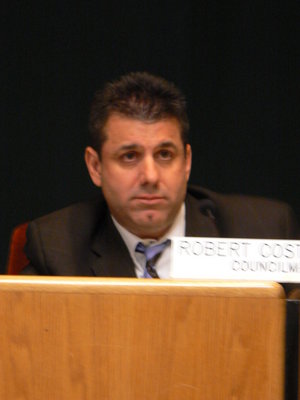For the first time in recent memory the Secaucus Town Council may be on track to introduce the municipal budget in the first quarter of the year. Because municipal budgets have been passed so late in previous years, much of the town’s fiscal year had also passed by the time the budget was adopted, leaving local officials less leeway to control annual spending.
On Tuesday, 1st Ward Town Councilman Robert Costantino, chair of the council’s Finance Committee, said auditors have already completed the preliminary work necessary for the chief financial officer and town administrator to begin drafting the municipal budget. Costantino said he believes that town staff will be able to present a budget to the Town Council by March 11, as Gov. Christopher Christie has urged New Jersey municipalities to do.
The next municipal budget could be approved as early as April.
Under the governor’s spending plan Secaucus will receive $1.817 million in state aid.
________
In 2008, the municipal budget was passed in August, the same month as the 2010 budget. In 2009, it was adopted in September.
Although some New Jersey municipalities use a fiscal year that runs from July 1 through June 30, Secaucus uses the calendar year as its fiscal year.
Costantino, Deputy Mayor John Bueckner, and the other members of the mayoral administration of Michael Gonnelli have long been critical of the late budget process.
“We fully expect to meet that March 11 deadline, and have the budget passed soon thereafter,” said Costantino. “That would be a marked improvement over previous years. I think everybody on this council felt the budget process got started much too late. And one of the things we really wanted to work on was completing the budget much earlier in the year.”
This is the first year the town is working with its new auditor, Bowman & Co. Previously, former town auditor Suplee, Clooney & Co. did the annual town audit and was involved in the budget process.
Currently the town is still operating under its 2010 budget, which has been amended since January because 2011 has already begun. The next budget to be introduced and adopted will be for 2011.
The town continues to operate under a temporary budget until the 2011 budget is approved.
State aid stays consistent
Mayor Dennis Elwell has said in the past that budgets were held up, in part, because the state did not tell New Jersey’s municipalities how much state funding they would be getting until midyear, which made it difficult for towns to draft their local spending plans.
This year, however, Gov. Christopher Christie has already released state aid allocations to municipalities.
Under the governor’s spending plan Secaucus will receive $1.817 million in state aid in New Jersey’s next fiscal year, which begins July 1. This is the same level of funding the town received in the current fiscal year.
The state operates under a fiscal year budget that runs from July 1 until June 30.
“When the governor said he was going to hold [state aid] steady, I expected our aid numbers to be the same as last year,” said Town Administrator David Drumeler the day after Christie released municipal state aid numbers last week.
After aid to municipalities was reduced last year many towns were concerned about further cuts this year. But, Drumeler said, “We don’t get a lot of state aid, especially when you compare what we get to other municipalities. When we get as little as we get there’s less of a downside if our aid gets cut. Obviously, every penny is important, but we’re in much better shape than a lot of municipalities.”
Tax impact
Town officials have not yet stated whether property taxes will rise, fall, or stay the same under the next municipal budget.
This year municipalities will be forced to comply with New Jersey’s 2 percent local property tax cap, which the governor signed into law last year and which took effect recently. The law, which caps annual municipal tax increases at 2 percent, was backed by Christie to stem rising property taxes.
Although some municipalities are concerned about how they will comply with the new law, Drumeler said he is “cautiously optimistic that we’ll be able to meet our cap expectations. We’re relatively fortunate considering the state of the economy.”
The 2 percent property tax cap law includes several budget items that are exempt from the cap, including health care costs and pension spending, costs that are growing at double-digit rates.
E-mail E. Assata Wright at awright@hudsonreporter.com.
